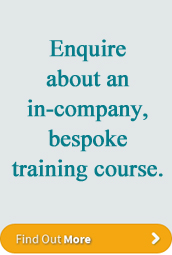You know when someone decides that the company is going to embark on a new initiative such as a customer care programme or work to a new set of company core values, or whatever, the processes and procedures are developed, the staff are given their training, suppliers and customers are warned and then … well, why doesn’t it ever work the way it was supposed to?
It happens time and time again, and each time we are told that this one is different; this one will work because the company is committed to it.
The trouble is that the company was committed to all the other initiatives which didn’t work.
So what goes wrong?
Well, when a company decides to implement a new initiative, be it customer care, empowerment or even cost containment, the company embarks on a new course. This course is plotted and handed out to each member of staff and they try, in vain, to implement it. “In vain” because they are trying to fit the initiative to one way of doing things – the way currently role modelled for them by senior management – the way which is culturally acceptable.
An example … I remember an HR director whom I had to restrain from issuing a directive to all staff telling them that they must attend the company empowerment programme. The director could see nothing wrong with doing this. It was how he had always got things done in the past!
Behaviour starts at the top with a clear indication from senior management that things are different, and this is portrayed by the things they do and how they do them, not the words they use. These new behaviours have to be planned; each senior manager needs to understand their role in the new culture and what changes they need to make to the way they manage for the new initiative to be reinforced.
Then, people who are to be on the receiving end of this new behaviour need to understand what is required of them and make their individual and collective decisions about the way they want to behave in order to achieve the end result.
The outcomes from this approach can be very powerful because ownership of the initiative is firmly with the people who are trying to carry it out … the staff.
Training offered by The Development Company
Managing Change “The Buxton Experience”
Change is a key feature within many organisations today and is now very necessary for survival. Planning for change often involves re-engineering processes, re-structuring departments and making changes to personnel. The new methods, approaches and practices encountered by managers and their staff can be very difficult to implement in the new, strange environments where people are uncertain of what is expected of them and what the future holds for them.
In The Development Company we have developed a method of enabling the employees (managers and staff alike) to become more comfortable with change and develop confidence in working with the new processes and methods.
Through our research with a number of companies and universities such as Barclays Bank, Rover Cars and Loughborough University we have concluded that three elements needed to be present for change to have a chance of being more successful:
- Development of new processes
- Development of the people
- Development of the culture
Culture is the one most likely to be ignored or left out and yet is the most powerful of these three elements.
“The Buxton Experience” is a tailored process designed to enable your managers and employees to:
- Identify the appropriate culture to support the changed priorities
- Manage that culture and measure its effectiveness against organisational goals
- Identify the development required for individuals, to provide them with the skills necessary for them to do their job to the satisfaction of the organisation
The result is designed to be a radical shift in values and behaviours from your people, enabling key results to be achieved when supported with other initiatives within the organisation.
“The Buxton Experience” is not a training programme. It is the start of the development of your people in line with your corporate objectives and becomes an ongoing process within your organisation.
Quote following a Buxton Experience (June 2001): “Better than drugs“.
– Paul Ovall, Toymaster
Managing Change – Case Studies
Click here to see Managing Change Case Studies.
Other Training Options:
For more information about our tailored training courses call 01933 227 695 or click here to contact us.
You know when someone decides that the company is going to embark on a new initiative such as a customer care programme or work to a new set of company core values, or whatever, the processes and procedures are developed, the staff are given their training, suppliers and customers are warned and then … well, why doesn’t it ever work the way it was supposed to?
It happens time and time again, and each time we are told that this one is different; this one will work because the company is committed to it.
The trouble is that the company was committed to all the other initiatives which didn’t work.
So what goes wrong?
Well, when a company decides to implement a new initiative, be it customer care, empowerment or even cost containment, the company embarks on a new course. This course is plotted and handed out to each member of staff and they try, in vain, to implement it. “In vain” because they are trying to fit the initiative to one way of doing things – the way currently role modelled for them by senior management – the way which is culturally acceptable.
An example … I remember an HR director whom I had to restrain from issuing a directive to all staff telling them that they must attend the company empowerment programme. The director could see nothing wrong with doing this. It was how he had always got things done in the past!
Behaviour starts at the top with a clear indication from senior management that things are different, and this is portrayed by the things they do and how they do them, not the words they use. These new behaviours have to be planned; each senior manager needs to understand their role in the new culture and what changes they need to make to the way they manage for the new initiative to be reinforced.
Then, people who are to be on the receiving end of this new behaviour need to understand what is required of them and make their individual and collective decisions about the way they want to behave in order to achieve the end result.
The outcomes from this approach can be very powerful because ownership of the initiative is firmly with the people who are trying to carry it out … the staff.
Training offered by The Development Company
Managing Change “The Buxton Experience”
Change is a key feature within many organisations today and is now very necessary for survival. Planning for change often involves re-engineering processes, re-structuring departments and making changes to personnel. The new methods, approaches and practices encountered by managers and their staff can be very difficult to implement in the new, strange environments where people are uncertain of what is expected of them and what the future holds for them.
In The Development Company we have developed a method of enabling the employees (managers and staff alike) to become more comfortable with change and develop confidence in working with the new processes and methods.
Through our research with a number of companies and universities such as Barclays Bank, Rover Cars and Loughborough University we have concluded that three elements needed to be present for change to have a chance of being more successful:
| Development of new processes | |
| Development of the people | |
| Development of the culture |
Culture is the one most likely to be ignored or left out and yet is the most powerful of these three elements.
“The Buxton Experience” is a tailored process designed to enable your managers and employees to:
| Identify the appropriate culture to support the changed priorities | |
| Manage that culture and measure its effectiveness against organisational goals | |
| Identify the development required for individuals, to provide them with the skills necessary for them to do their job to the satisfaction of the organisation |
The result is designed to be a radical shift in values and behaviours from your people, enabling key results to be achieved when supported with other initiatives within the organisation.
“The Buxton Experience” is not a training programme. It is the start of the development of your people in line with your corporate objectives and becomes an ongoing process within your organisation.
Quote following a Buxton Experience (June 2001): “Better than drugs“.
– Paul Ovall, Toymaster
[ Train the Trainer ] [ Recruitment & Selection Interviewing ] [ Performance Review / Appraisal Skills ] [ Management Development ] [ Personal Development ] [ Enquire About an in-Company Course ]
For more information about our tailored training courses
call 01604 810 801 or click here to contact us.









